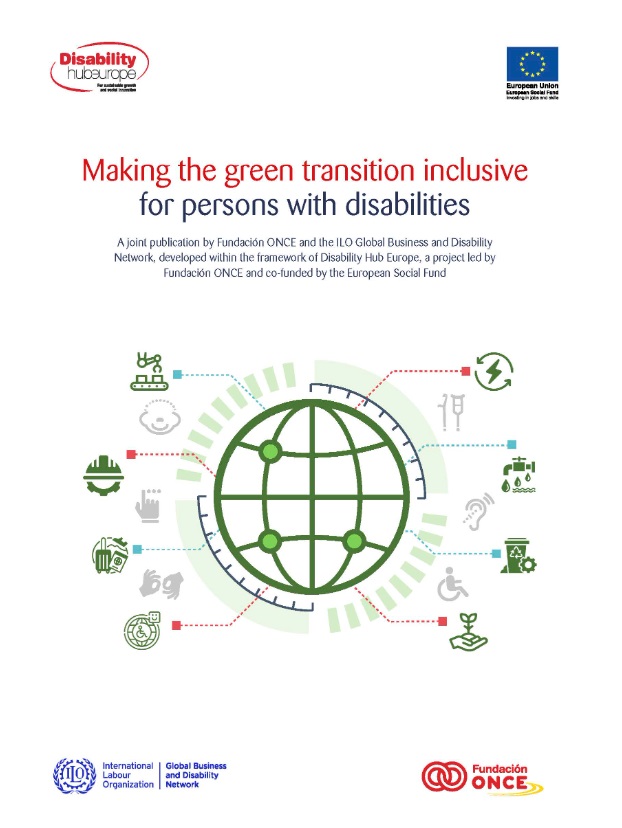- Fundación ONCE and the ILO Global Business and Disability Network (ILO GBDN) present this report, developed under the auspices of the Disability Hub Europe.
- Education & training, accessibility, and inclusive dialogue are some of the keys to a green transition that leaves no one behind, according to this publication.
November 15, 2023. Fundación ONCE and the ILO Global Business and Disability Network (ILO GBDN) have presented the report "Making the Green Transition Inclusive for Persons with Disabilities". The presentation took place during ILO GBDN 10th Global Annual Conference titled “Disability in sustainability efforts: businesses leading the way”, celebrated at ILO headquarters.
The publication has been developed under the auspices of the Disability Hub Europe, a project, led by Fundación ONCE and co-funded by the European Social Fund, counting with ILO GBDN as one of the main partners.
The document “Making the Green Transition Inclusive for Persons with Disabilities” jointly elaborated by ILO and Fundación ONCE, delves into the changes that the world of work is undergoing in response to the impacts of climate change, examining various key sectors and with a special focus on the inclusion of people with disabilities. In this regard, it identifies challenges and opportunities and provides recommendations for all stakeholders to promote an inclusive transition that leaves no one behind.
Some of its main conclusions include that the green transition will imply employment opportunities for people with disabilities in various economic sectors and for a wide range of educational levels. Also, the transition can help reduce job polarization from digitalization, creating jobs in the middle of wage and skill distributions. Furthermore, the inclusion of people with disabilities will bring valuable perspectives to companies for sustainability and innovation in eco-related roles. However, this will only be possible if the transition is accompanied by inclusive training and education, as well as appropriate accessibility tailored to the needs of each individual and each sector.
The Impact of Climate Change on People with Disabilities
Climate change is not just an environmental crisis but also a social and economic challenge, forcing us to transform our modes of production and consumption and change the way we work, live, eat, and travel. This transformation will impact the world of work, where jobs will be created, but also eliminated and transformed, generating opportunities as well as challenges for the involved parties, particularly for groups at risk of exclusion, such as people with disabilities.
People with disabilities are more likely to experience the negative impacts related to limited resource availability, and at the same time, they are among the most affected and the first to suffer the negative effects of the transformation of the economy to meet environmental goals. However, they are often overlooked in the development of public policies in response to environmental challenges and adaptation efforts.
According to the document, to achieve a just transition, the following is necessary: to provide continuous, inclusive training tailored to the specific needs of people with disabilities; to make social dialogue with underrepresented groups central in all policy-making processes; and to incorporate inclusion and accessibility into the transition process toward a more ecological economy and social protection systems. This transition cannot be considered "just" if it continues to ignore the persistent marginalization of people with disabilities in the labor market or exacerbates the already disproportionate effects of climate change on them.
Key Sectors for an Ecological, Just, and Inclusive Transition
The paper examines how the ecological transition will impact nine key economic sectors (Energy, Transport, Construction and Real Estate Activities (Buildings), Manufacturing, Agriculture, Farming and Fishing Water Supply and Management, Waste Management, Forestry, and Tourism) and how this can present opportunities and/or challenges for people with disabilities. The main conclusions of this analysis point to the profound transformation of the labor market, which will entail a loss of jobs in sectors most responsible for CO2 emissions but also the creation of new job opportunities for people with disabilities if the transition is accompanied by adequate training for the shift to green employment. This training should be provided at all levels, including job search, skill enhancement, and mentoring.
However, if people with disabilities and the organizations representing them are not taken into account from the outset in the creation of public policies and strategies focused on adapting the labor market, the ecological transition will pose an additional challenge and barrier for this group. The need for social dialogue is even more urgent for people with disabilities who also belong to groups that have historically faced greater barriers in the world of work, such as youth, women, and migrants. Furthermore, there is a need for a change in social protection systems in favor of people with disabilities, reflecting the reality of their work life.
In light of the above, the document urges the public and private sectors, organizations of people with disabilities, labor unions, and academic institutions to collaborate for a just and green transition, allocating funds for training and capacity building for the creation of public policies and participation in social dialogue spaces regarding the world of work transition.
Finally, the publication emphasizes the need to advance research on this phenomenon, highlighting the need for statistics and data on new job opportunities within the framework of the green transition, which should be available to interested parties.
Fecha:




